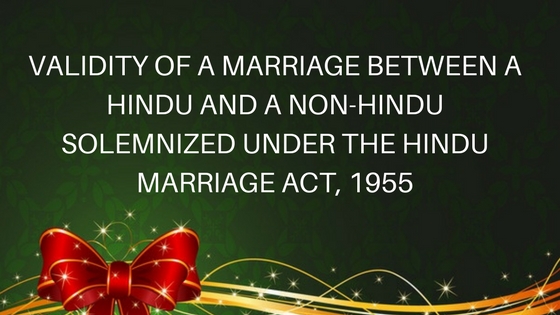
Aapka Consultant Judgment Series- In this series, we are providing case analysis of Landmark Judgments of Hon’ble Supreme Court of India.
Gullipilli Sowria Raj Vs. Bandaru Pavani alias Gullipili Pavani
AIR2009SC1085, (2009)1SCC714
Hon’ble Judges/Coram: Altamas Kabir and Aftab Alam, JJ.
Decided On: December 4th, 2008
FACTS:
The appellant was a Roman Catholic Christian and the respondent a Hindu. They got married on October 24th, 1996. The marriage was registered on November 2nd, 1996 under Section 8 of the Hindu Marriage Act, 1955. On March 13th, 1997 the respondent-wife filed a petition under Section 12(1) c of the Hindu Marriage Act for a decree of nullity of marriage entered into between the parties on the ground that the marriage was contracted through misrepresentation by the appellant regarding his social status and that he was a Hindu by religion, although the appellant and all his family members all professed the Christian faith. The Family Court dismissed this petition. An appeal was preferred against the decision of the Family Court. The High Court allowed the appeal holding that the marriage between a Christian and a Hindu under the Hindu Marriage Act was void ab initio.
ISSUE:
Whether a marriage solemnized between a Hindu and a non-Hindu is valid under Hindu Marriage Act, 1955?
JUDGMENT:
The Court held that in the present appeal, the only question for determination was whether a marriage entered into by a Hindu with a Christian is valid under the provisions of the Hindu Marriage Act, 1955. It was the argument of the appellant that the Hindu Marriage Act does not preclude a Hindu from marrying a person of some other faith. It was contended that the use of the word ‘may’ in the opening words of Section 5 of the Hindu Marriage Act seems to indicate that the conditions were not mandatory and therefore the said condition would not be binding on the marriage. It was also submitted that none of the conditions indicated in Section 11 apply to the facts and therefore the marriage between the appellant and the respondent could not be said to be a void marriage. It was submitted that Section 11 would override the ostensibly optional provisions of Section 5.
For the respondent, it was argued that the preamble to the Hindu Marriage Act unambiguously states that the Act was promulgated to amend and codify law relating to marriage amongst Hindus. Moreover, Section 2(1)(c) specifically excludes a person of the Christian faith from the ambit of the Act. The Indian Marriage Act recognizes the marriage between a Christian and non-Christian to be valid, but only under the provisions of the Special Marriage Act. The conditions indicated in Section 5 were to apply in respect of a marriage between two Hindus and that a Hindu marriage could be solemnized only between two Hindus only when the conditions set out in the provisions contained therein had been fulfilled. Since the marriage did not fall within the categories under Section 11, the appellant had rightly taken recourse under Section 12(1)(c) to hold the marriage as a nullity on account of misrepresentation on part of the appellant.
The Court held that in view of the definite scheme of the Hindu Marriage Act, it was unable to agree that the Hindu Marriage Act did not prohibit a valid Hindu marriage of a Hindu and another person professing a different faith. The Court relied on the preamble to the Hindu Marriage Act and Section 2 of the Hindu Marriage Act to reinforce its stance. The Court observed that the use of the word ‘may’ in the opening line of Section 5 does not make the provisions of Section 5 optional. A marriage can be solemnized between two Hindus if the conditions indicated were fulfilled. The expression ‘may’ used in the opening words of Section 5 is not directory but mandatory and non-fulfilment thereof would not a marriage under the Act between two Hindus. Also, Section 7 is to be read along with and in harmony with Section 5. The Court held the marriage to be a nullity and observed that its registration could not/ did not validate the same.
HELD:
The appeal was dismissed. A marriage between a Hindu and a non-Hindu could not be a valid Hindu Marriage under the Hindu Marriage Act, 1955.
To Get Legal Opinion from Advocates/ Legal Experts, Please click here
To Get Legal Opinion from Retired Hon’ble Judges, Please click here











